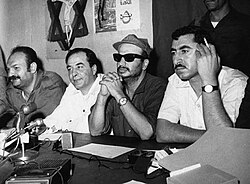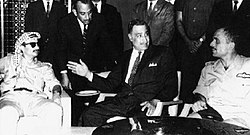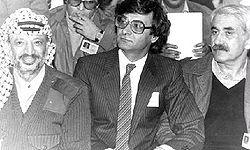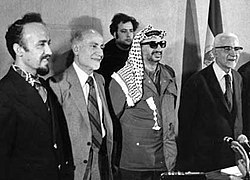Yasser Arafat
Yasser Arafat[note 1] (24 August 1929 – 11 November 2004) was Chairman of the Palestine Liberation Organization (PLO) from 1969 to 2004. In 1993, he also became president of the Palestinian National Authority (PA).
Yasser Arafat | |
|---|---|
ياسر عرفات | |
 Yasser Arafat speaking at the World Economic Forum in 2001 | |
| 1st President of the Palestinian National Authority | |
| In office 5 July 1994 – 11 November 2004 | |
| Prime Minister | |
| Succeeded by | Rawhi Fattouh (interim) |
| Third Chairman of the Palestine Liberation Organization | |
| In office 4 February 1969 – 29 October 2004 | |
| Preceded by | Yahya Hammuda |
| Succeeded by | Mahmoud Abbas |
| Personal details | |
| Born | Mohammed al-Qudwa al-Husseini 24 August 1929 Cairo, Egypt |
| Died | 11 November 2004 (aged 75) Clamart, Hauts-de-Seine, France |
| Resting place | Arafat's compound, Ramallah, Palestine |
| Nationality | Palestinian |
| Political party | Fatah |
| Profession | Civil engineer |
| Signature |  |
Arafat was born in Jerusalem, Gaza or Cairo.[1] He studied civil engineering at Cairo University. He worked as an engineer in Kuwait.
In 1994, Yasser Arafat won the Nobel Peace Prize along with two others.[note 2] .[2]
Some people see him as a hero, who fought for the cause of the Palestinian people. Others see him as a terrorist, who promoted the use of violence to destroy Israel.
Arafat died in Paris from a cerebral hemorrhage. The next day he was buried at his compound, with a funeral in Ramallah on November 12.
Yasser Arafat Media
Arafat (right) with his sister Khadija and brother Fathi in Cairo, 1942
Arafat with Democratic Front for the Liberation of Palestine leader, Nayef Hawatmeh and Palestinian writer Kamal Nasser at press conference in Amman, 1970
Egyptian President Gamal Abdel Nasser (center) mediating an agreement between Arafat and Jordanian King Hussein to end to the Black September conflict, during the emergency Arab League summit, September 1970
Yasser Arafat visits East Germany in 1971; background: Brandenburg Gate
Yasser Arafat with Bhim Singh, founder of Jammu and Kashmir National Panthers Party, in the 1970s
Arafat in a Palestinian refugee camp in Southern Lebanon, 1978
Arafat with Palestinian poet Mahmoud Darwish (center) and PFLP leader George Habash (right) in Syria, 1980
Arafat with Iranian Prime Minister Mehdi Bazargan, days after Iranian Revolution
Yitzhak Rabin, Bill Clinton, and Arafat during the Oslo Accords on 13 September 1993
Arafat, Shimon Peres and Rabin receiving the Nobel Peace Prize following the Oslo Accords, 10 December 1994
Footage of Arafat speaking and meeting international leaders
Related pages
Notes
- ↑ Also spelled Yassir Arafat (Arabic: ياسر عرفات). He was born Mohammed Abdel-Raouf Arafat al-Qudwa al-Husseini (محمد عبد الرؤوف القدوة الحسيني). He is also known by the kunya Abu `Ammar (أبو عمّار).
- ↑ The others were Yitzhak Rabin and Shimon Peres.
References
- ↑ Most sources indicate Cairo as Arafat's place of birth, but others list his birthplace as Jerusalem or Gaza. See here and here for more information.
- ↑ NobelPrize.org, "Yasser Arafat"; retrieved 2012-9-19.
Other websites
![]() Media related to Yasser Arafat at Wikimedia Commons
Media related to Yasser Arafat at Wikimedia Commons
- Life in Palestine after Arafat, Situation worse, not what Bush and Sharon planned Archived 2005-04-16 at the Wayback Machine
- The Real Obstacle to Peace was Ariel Sharon, not Yasser Arafat
- Death of Arafat, burial and reburial November 13 2004
- .theguardian.com/world/2012/nov/01/israel-acknowledges-killing-palestinian-deputy Israel acknowledges killing Yasser Arafat's deputy Khalil al-Wazir in 1988 raid









